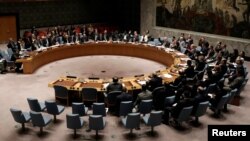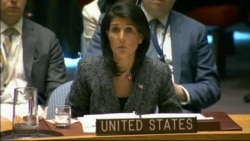ຣັດເຊຍ ແລະ ຈີນ ໄດ້ໃຊ້ສິດຢັບຢັ້ງ ຕໍ່ຍັດຕິຂອງອົງການສະຫະປະຊາຊາດ ທີ່ຈະວາງ
ມາດຕະການລົງໂທດ ຕໍ່ຊີເຣຍ ເພື່ອເປັນການຕອບໂຕ້ ຕໍ່ອັນທີ່ປາກົດວ່າ ຊີເຣຍໄດ້ໃຊ້
ອາວຸດເຄມີ ໂຈມຕີຫຼາຍຄັ້ງຜ່ານມາ.
ມາດຕະການດັ່ງກ່າວ ທີ່ໄດ້ສະໜັບສະໜູນ ໂດຍບັນດາປະເທດ ມະຫາອຳນາດ ຕາເວັນ
ຕົກເຊັ່ນ ອັງກິດ ຝຣັ່ງ ແລະ ສະຫະລັດ ຈະລົງໂທດຊາວຊີເຣຍ 21 ຄົນ ອົງການ ແລະ
ບໍລິສັດຕ່າງໆ ທີ່ປາກົດວ່າມີສ່ວນກ່ຽວຂ້ອງ ໃນການໂຈມຕີດ້ວຍອາວຸດເຄມີ ໃນປີ 2014
ແລະ 2015.
ຍັດຕິນີ້ຍັງຫ້າມທຸກປະເທດ ບໍ່ໃຫ້ສະໜອງລັດຖະບານຊີເຣຍ ດ້ວຍເຮືອບິນເຮລິຄອບເຕີ
ຊຶ່ງໄດ້ຖືກໃຊ້ໃນການໂຈມຕີທັງຫຼາຍນັ້ນ.
ມາດຕະການນີ້ ຖືກຮ່າງຂຶ້ນມາ ຫຼັງຈາກທີ່ໄດ້ມີການສືບສວນສອບສວນຮ່ວມກັນໂດຍ
ສະຫະປະຊາຊາດ ແລະ ອົງການຫ້າມໃຊ້ອາວຸດເຄມີ ຊຶ່ງໄດ້ພິຈາລະນາວ່າ ລັດຖະບານ
ຊີເຣຍ ໄດ້ດຳເນີນການໂຈມຕີຢ່າງນ້ອຍ 3 ຄັ້ງ ທີ່ພົວພັນກັບການໃຊ້ແກັສຄລໍລີນ. ກຸ່ມ
ດັ່ງກ່າວ ຍັງໄດ້ພົບເຫັນວ່າ ພວກຫົວຮຸນແຮງລັດອິສລາມ ແມ່ນຢູ່ເບື້ອງຫລັງການໂຈມຕີ
ຢ່າງນ້ອຍນຶ່ງຄັ້ງ ທີ່ພົວພັນກັບການນຳໃຊ້ແກັສມັສຕາດ.
ປະທານາທິບໍດີ ຣັດເຊຍ ທ່ານ Vladimir Putin ໄດ້ເຕືອນວ່າ ການວາງມາດຕະການ
ລົງໂທດ ຕໍ່ຊີເຣຍ ໃນລະຫວ່າງທີ່ມີການເຈລະຈາສັນຕິພາບຢູ່ທີ່ນະຄອນ Geneva
ທີ່ນຳພາໂດຍສະຫະປະຊາຊາດນັ້ນເຫັນວ່າ “ບໍ່ເໝາະສົມເລີຍ” ແລະ ມັນຈະຂັດຂວາງ
ຄວາມພະຍາຍາມ ທີ່ຈະຍຸຕິບັນຫາຂັດແຍ້ງ ທີ່ແກ່ຍາວມາໄດ້ 6 ປີແລ້ວນັ້ນ.
ຫຼັງຈາກທີ່ໄດ້ລົງຄະແນນສຽງແລ້ວ ທ່ານນາງ Nikki Haley ເອກອັກຄະລັດຖະທູດ
ສະຫະລັດ ປະຈຳສະຫະປະຊາຊາດ ໄດ້ກ່າວຕໍ່ບັນດາສະມາຊິກສະພາຄວາມໝັ້ນຄົງ
ວ່າ ຍັດຕິນີ້ ແມ່ນ “ເໝາະສົມທີ່ສຸດ” ແລະ ໄດ້ກ່າວຕື່ມວ່າ “ມັນເປັນມື້ທີ່ໂສກເສົ້າ
ສຳລັບສະພາຄວາມໝັ້ນຄົງ ຂອງສະຫະປະຊາດ ໃນເວລາ ບັນດາສະມາຊິກ
ເລີ້ມແກ້ໂຕໃຫ້ແກ່ປະເທດທີ່ເປັນສະມາຊິກ ທີ່ເຂັ່ນຂ້າປະຊາ ຊົນຂອງຕົນ.”
ທ່ານນາງ Haley ເວົ້າວ່າ “ແນ່ນອນທີ່ສຸດ ໂລກເຮົາເປັນບ່ອນ ທີ່ມີອັນຕະລາຍ
ຫຼາຍຂຶ້ນ.”
ລັດຖະບານຊີເຣຍ ໄດ້ປະຕິເສດຊ້ຳແລ້ວຊ້ຳອີກ ຕໍ່ການນຳໃຊ້ອາວຸດເຄມີ ໃນສົງຄາມ
ທີ່ໄດ້ເອົາຊີວິດປະຊາຊົນໄປແລ້ວ ຫຼາຍກວ່າ 300,000 ຄົນ.
ການລົງຄະແນນສຽງດັ່ງກ່າວ ແມ່ນຄັ້ງທຳອິດທີ່ມີການປະເຊີນໜ້າກັນ ຢູ່ທີ່ອົງການ
ສະຫະປະຊາຊາດ ລະຫວ່າງຣັດເຊຍ ແລະສະຫະລັດ ນັບຕັ້ງແຕ່ປະທາ ນາທິບໍດີ
ດໍໂນລ ທຣຳ ໄດ້ເຂົ້າຮັບຕຳແໜ່ງ ໃນເດືອນມັງກອນ ເປັນຕົ້ນມາ ແລະ ທ່ານໄດ້
ປະຕິຍານວ່າ ຈະເສີມຂະຫຍາຍສາຍພົວພັນກັບ ມົສກູ.
Russia and China have vetoed a United Nations resolution that would have placed sanctions on Syria in response to alleged chemical weapons attacks.
The measure, backed by the Western powers of Britain, France and the United States, would have imposed sanctions on 21 Syrians, organizations and companies that were allegedly involved in chemical attacks in 2014 and 2015.
The resolution would have also banned all countries from supplying the Syrian government with helicopters, which were used in the attacks.
The measure was drafted after a joint investigation by the U.N. and the Organization for the Prohibition of Chemical Weapons determined the Syrian government carried out at least three attacks involving chlorine gas. The groups also found that the Islamic State extremist group was behind at least one attack involving the use of mustard gas.
Russian President Vladimir Putin warned that imposing sanctions on Syria during the U.N.-led peace negotiations in Geneva would be "completely inappropriate" and thwart efforts to end the six-year conflict.
After the vote, U.S. Ambassador Nikki Haley told council members the resolution was "very appropriate," and added, "It is a sad day on the Security Council when members start making excuses for other member states killing their own people."
"The world is definitely a more dangerous place," Haley said.
The Syrian government has repeatedly denied using chemical weapons in the war that has claimed the lives of more than 300,000 people.
The vote was one of the first showdowns at the U.N. between Russia and the U.S. since President Donald Trump took office inJanuary and vowed to strengthen relations with Moscow.
Nine members of the U.N. Security Council voted in favor of the measure. Bolivia voted against the resolution, while Egypt Ethiopia and Kazakhstan abstained. A resolution requires nine votes in favor and no vetoes by Britain, China, France, Russia and the U.S.











